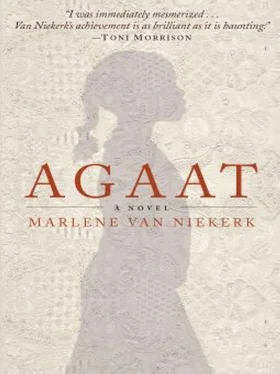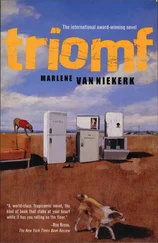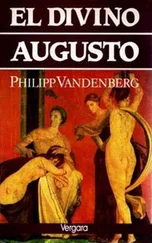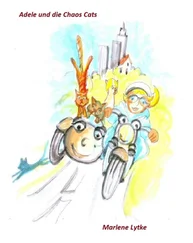She jerked up the railing, rammed extra cushions behind my back, far enough from the bed-head so that she could reach easily behind my head, pushed the bed still further from the wall so that she could move around me freely. The black comb half protrudes from the top pocket of the apron, the curlers are clasped on both sides of the bib of the apron. A bottle of water with a spray head stands ready in the trolley. She comes and stands behind me. Ceremoniously. After the fashion of a salon. Chez Agaat. My stylist and I.
So, she says, today exactly a month ago we last cut and look, it’s grown a whole inch.
With the comb she pulls a strand of hair away from my head so that I can see. A mouse tail, thin and grey. She looks at me in the hand mirror.
Just see how much vigour there still is in you, she wants to say. She bethinks herself. But the thought is a snare. She’s already caught in it. In her own snare. I know it. The teeth are bared, the nails come out. It’s a reflex. She combs hard, straight partings in my hair. She plucks up tufts of hair, she pinions them in stiff crests with curlers. Now I am also in battle array. Sound the horn! Charge!
Grow forth! would be the wrong battle cry. She wouldn’t dare shout it out loud. But it’s a snake from which a string of white eggs slip. I see them rise up behind her cap like thought balloons in a comic strip.
A whole inch of hair! Without sun? Without bread? What are these strings that can grow from nothing? How many metres in a lifetime? And whom would you want to appoint to measure it for you? Because there are still the few inches that have to grow out in the coffin. Threads of a worm that grazed in poplars. Spun of last thoughts. At last all bright and clear. Silver-white hair. Pitch-black blood.
Is that what she thinks? I no longer know.
Ounooi, she says, don’t perform like that. I know you don’t like it, but when it’s all over you always feel miles better.
She drags the comb through a few times, walks to the calendar, marks off the date with the pencil suspended there from a string. 11 December 1996. She taps the back of the pencil on the dates of the past days. Has now pasted the old paper on the reading stand. Middle column, last row. Agaat’s periodic table. Bisacodyl suppository. Tap. Lactulose. Tap. Know it by heart already. But it’s one thing she won’t scrap from her battery. She’s besotted with the bizarre names of the medicines, the sadistic language of the recommended treatments. Symptom: large bowel stoppage. Therapy: Exercise. Tap, tap, tap.
Not difficult to decipher, the tapping. It’s Morse code for The Pan. It says: More hairs come forth from your head, Mrs de Wet, than dung from your belly. The Skull Pan is replete but the Other Pan is empty. Almost seven days nothing but winds in it.
Shit and hair. The last secretions of the almost-dead. Shit and hair.
Like old oil still leaking from an engine on the scrap-heap. And piss and nails. That’s why they stopper you with a plug or two. So that you don’t start oozing and spoil your coffin, or interrupt the sermon. That’s why they draw a little net over your hair. So that your skull doesn’t start rustling. And that’s why they bind up your jaw. So that the tongue doesn’t erupt in post-mortem gabbling.
Beloved, go forth in peace and pinch your noses. In the name of the Lord who created heaven and earth because He also designed the fragrant death. The jaw drops open with a snap. Bluetongue put out at the pulpit cloth. Lisping among the lilies.
That’s the kind of disgrace that must be guarded against.
I look at myself in the mirror. Wordlessly my eyes blaspheme. How many watts worth of sacrilege? Blasphemy without the use of the orbicularis oris muscles. That’s what she wants from me. She wants to see how far she can push me. Drained to the last of the lees. On my knees in the sawdust. In the dry course of the drift. In the place where the last footlight fades to black.
Agaat puts the mirror down flat. She wipes my eyes, she wipes away the spit dribbling from my mouth.
Who needs the old mirror anyway, she says, rather look at what I’ve displayed for you, the whole of Grootmoedersdrift, Ounooi, from front to back. Better than the movies.
I hear another language in the clacking of the scissors.
What more can you want? Speaking of hair, it gets into my hair, I can tell you, it gets into my hair looking after you like this!
Tchip. A big shiny swallow with two sharp wings, a flying dive narrowly missing my eyebrows.
A dirty-grey skein of hair falls on the sheet. More than an inch I’d say, more than two even.
Agaat likes an open face.
It carried on for three days, the carrying-in. Where she had stored it all, everything that had been on the discard heap, I don’t know. In the cellar? Sometimes I heard a bumping and bustling here under me. Other items emerged from the storeroom, from the outside room. Everything that she’d removed from the room here has been restored. The built-in cupboards are filled with my clothes again. She brought in armloads at a time with hangers and all and piled them up on my bed, spread out shawls and skirts before me, pressed the jerseys against my cheek. The soft red mohair, the little maroon one that smells of Chanel No. 5 that she was so mad about when she was small. The dances, the mountains, the snow, the sea. Everything back into the drawers.
The hat-stand, the walking stick stand with all the umbrellas, the walking frame, the trolley. She came wheeling in here at speed, in one or other of my wheelchairs, first with the Spyder as if she were taking part in a paraplegic race and then all whooshing with the Redman and then standing in the IBot with the knee-support flapped up. Like the Popemobile it looked. All that was missing was for her to wave blessings. The head-dress everybody would have recognised.
I went to sleep intermittently with all the activity. Sometimes I thought I was dreaming. When I woke up there was a clattering in the passage and then yet another object was dragged in from the shed. A bag of guano, a bag of chicken feed, a can of dipping fluid, a can of vaccine, the ploughshare from under the wild fig tree and the pipe for striking it, a silver corner post, three droppers, freshly-tarred, feathers of the red rooster, feathers of the white rooster, a sheaf of wheat, a bag of compost, a ram’s horn, a horseshoe, a skein of the finest wool. Held in front of my nose for me to smell, all of it. Rustling, the grasses, the pods. Struck, the gong, shaken out, the coir sacks, just about the whole farm carted in at the back door on a wheelbarrow from sheep-shears to rake. I heard her give the labourers three days’ leave so that she could complete it all in peace. Because whom would they suspect of being crazy? They know I just lie here. They know it’s been a year since I said anything.
The trocar and cannula.
The lip-halter.
The mowing-snaffle.
A bray-pole.
A tine of the shallow-toothed harrow.
A rowel from the seed-hopper.
The tool with which the fencing-wire is twisted.
One by one she came and held the things in front of me. Until I signalled no, that’s not what I want to see. Sometimes I thought she wanted to put the snaffle under my tongue, fit the halter to my upper lip, punch a hole in me with the trocar between my short-rib and my hipbone in hopes of deflating me, so that the sound from my hip would sound the word for her, the name of the thing that I’m dying to see, the old maps that for her own murky reasons she cannot find in her heart to go and dig up in the sitting room. As if she’s scared that something might bite her there in the sideboard.
Tchip, tchip, tchip, go the scissors, faster and faster. I feel the blades against my ear. Hair goes flying. The whole awning is full of snippings. I see them dry, the little wet tails becoming fluff, puffing up, starting to roll around and disintegrate, thousands of crescents stirring in the slipstream of my stylist as she moves around the bed. Here comes the spray bottle. Zirrrts, zoorrrts, from all sides. As if I were a rose-tree full of lice. Rosecare. What’s in a rose. Young Miss Redelinghuys. The rose of Tradouw.
Читать дальше












